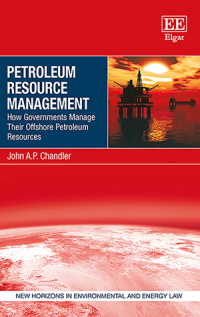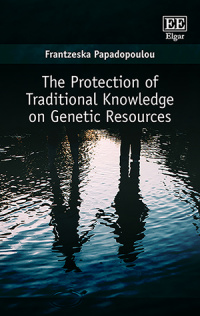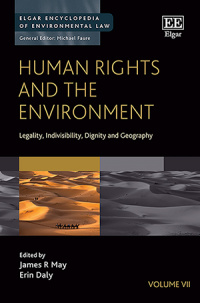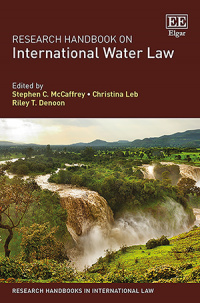
Volume 15/2
SPECIAL ISSUE
Designing law and policy towards managing plastics in a circular economy
This Special Issue is the outcome of a workshop organised at SOAS University of London in June 2018 by the Environmental Regulatory Research Group at the School of Law, University of Surrey, the Law, Environment and Development Centre (LEDC) at the School of Law, SOAS, the Doctoral School at SOAS and the School of Law, Essex University.
The trigger for this workshop was the fast-increasing global focus on plastics and plastic waste as an object of concern in recent years. In a context where the world has produced as much plastic since the beginning of the twenty-first century as in the whole of the twentieth century, warning signs observed by scientists have increasingly led to demands being placed on politicians, multinational enterprises, lawyers and policy makers to come up with initiatives that can address the crisis. It is now recognised that we have reached peak-plastic at a planetary scale. Reversing the trend of increased plastic use, as well as cleaning up existing plastic pollution from the oceans, waterways and land, is an immense law and policy challenge. It will have an impact on all aspects of the global economy, environment as well as citizens. In recent years, some key generators and managers of plastic waste have taken some action. Initiatives include the European Commission’s Strategy for Plastics in a Circular Economy, China’s 2017 measures to address plastic management that included the banning of solid waste imports, and the organisation of a plastic-centred World Environment Day in 2018. Efforts to address the plastic surge in different parts of the world notwithstanding, there is a strong North-South dimension to plastics recently highlighted by the Chinese ban on plastic waste imports. In other parts of the Global South, the issue is not just an environmental one but also one linked to livelihoods. The legal and regulatory challenges to achieve systemic transformation need to be identified, understood and reimagined to deliver outcomes that can lead to a world, which minimises the use of plastics and ensures that no plastic waste ends up in the environment. The measures that need to be taken include strict environmental regulation for supply-side management of commodities, the production and processing by actors associated with plastics including recycling and banning the disposal of waste either domestically or in other countries.
The workshop and this Special Issue started from the premise that plastic production will not stop in the short term and that there is no obvious substitute for various uses of plastics…
R. Clift, H. Baumann, R. J. Murphy and W. R. Stahel
Managing Plastics: Uses, Losses and Disposal
The term “plastic” refers to a wide range of different materials with diverse properties and uses. Plastics are essential in a modern industrial economy. Plastic pollution results from the “leakage” of plastics into the unconfined environment at all stages of the product cycle, not just following use, so the highest priority to prevent continuing pollution is to ensure that all plastics remain within the economy. The “circular economy” approach may reduce but cannot eliminate plastic pollution without effective measures to prevent leakage. Measures to prevent leakage must be based on understanding of how plastics are brought into and moved through the economy; of the practical options for reducing demand for fresh plastic, re-using and recycling plastic products, and managing final waste; and on prioritizing development of alternative materials for specific uses.
Even if leakages of plastic into the environment are curtailed, the legacy of plastic pollution over the last seventy years will remain, particularly in the oceans. Marine plastic litter is a problem of the Global Commons and requires global action for its collection. Currently, landfilling of collected marine plastic debris is the only feasible option but, if economic uses can be found, this will partially offset future demand for fresh plastics.
Katrien Steenmans
Extended Producer Responsibility: An Assessment of Recent Amendments to the European Union Waste Framework Directive
The vast amount of plastic waste produced is a huge problem that requires urgent action. A “circular economy” approach, where resource and waste streams are reused, recycled, or recovered instead of sent to landfill or incinerated in order to achieve both economic prosperity and environmental protection, has been promoted by, inter alia, the European Union (EU) and Ellen MacArthur Foundation to improve plastic waste management to prevent plastic waste being “wasted”. Extended producer responsibility (EPR) is a tool that can be used to help implement circular approaches that has been implemented at EU level by the Waste Framework Directive (WFD) 2008/98/EC. Such schemes shift responsibilities for waste management from consumers and authorities (those traditionally made responsible) to the producer of a product. The EU implementation of EPR has, however, been criticised in the literature and is therefore considered to have limited impact. Directive 2018/851 has recently amended the 2008 WFD with its explicit aim in part to clarify the EPR provisions. This article investigates, by adopting a doctrinal approach, to what extent the Directive 2018/851 amendments to the 2008 WFD EPR scheme address criticisms of EPR for the purpose of facilitating transitions towards circular economies. This article concludes that there are some criticisms that are addressed, but many remain unresolved.
Nicholas O. Oguge
Circular Economy Measures: An Opportunity For Rethinking Plastics Waste Governance in Kenya
In Kenya, disposal of plastics waste particularly from packages is an obvious environmental, health and social concern contributing to substantial amounts of municipal solid waste and clogging of drainage systems among other problems. Legally, the plastics waste problem is currently addressed through the Kenya Gazette Notice No 2356 of 14 March 2017. This law is limited to the ban on the use, manufacture and importation of all plastic bags used for commercial and household packaging. Whilst good progress may have been made to reduce the menace, no data is currently available on impacts. Persistence of the problem, particularly from plastics waste not covered by the ban, would suggest that the current approach, however progressive, is inadequate to comprehensively address the issues surrounding plastics waste governance in the country. Articles 42 and 72 of the Kenyan Constitution recognize sustainable development as a principle of governance hence providing a basis for developing innovative approaches to managing plastics waste. Opportunities therefore exist in the application of circular economic measures to change the value system of plastics use and disposal in the society. This would require the development of a governance ecosystem that encapsulates the entire value chain in creating conditions for prudence in the use of plastics to grow the economy, create inclusive jobs, conserve the environment, and embrace societal needs. The tenets for growing that ecosystem forms the basis of this article.
Mounir Zaouaq et Karim Zaouaq
Law and policies applicable to the management of plastic waste in Morocco
As major factor of environmental degradation in Morocco, plastic waste has for many years been at the heart of efforts undertaken by the Kingdom, both at the legislative and regulatory levels and through its public national and territorial policies. Yet, results so far remain below expectations due to various encountered obstacles including limits in the sorting of waste, the collection and recycling of waste, as well as weak coordination between the actors involved in terms of the different provinces and prefectures within the Kingdom.
Le droit et les politiques applicables à la gestion des déchets plastiques au Maroc
Constituant un facteur important de dégradation de l’environnement au Maroc, les déchets plastiques sont, depuis des années, au cœur des efforts entrepris par le Royaume tant au niveau législatif et réglementaire que dans ses politiques publiques nationales et territoriales. Or, les résultats obtenus jusqu’à aujourd’hui demeurent en deçà des attentes en raison de diverses entraves telles que le degré encore limité du tri, de la collecte et du recyclage des déchets et la faible coordination entre les acteurs impliqués dans ce domaine au niveau des différentes provinces et préfectures du Royaume.
Chung-Hsien Lee
Taiwanese Plastics Versus Sustainability - From the Perspective of Glocalization of Sustainable Development and Circular Economy
This paper argues for the importance of maintaining the comprehensiveness, coherence and consistency within the legal system regulating plastics in Taiwan and in this case peculiarly the regulatory strategy of the plastics reforms, namely the 2018 plan. The first two sections of this paper introduce the history of regulatory measures against plastic use in Taiwan since 2002 and a road map of the 2018 plan that eventually leads to a blanket ban on the use of single-use plastic products by 2030. Section three raises criticism of the 2018 plan, relating to ambiguities within normative system and rule-making procedure. In section four, it is argued that the cause of the ambiguous phenomena is the ambivalence in terms of the core value within Taiwanese society, which is reflected in the lack of genuine and ultimate legislative purposes to dominate and guide the 2018 plan.
The paper further analyses that this reform is not merely a unilateral action out of autonomous efforts but an evolution that should be situated in a wider context. The regulatory history together with the unique international status of Taiwan demonstrates these are the results of interactions between state agency and international socio-cultural structure. Taiwan’s regulatory history and tendency factually exhibits the world-system of the capitalist world economy.
However, these do not imply that there is no room for any entity within this system to demonstrate different rationale and discursive resistance to exhibit some sort of autonomy. The Control Yuan, one of the five highest constitutional institutions in Taiwan, officially criticises and rejects the model of circular economy pursuit by the EPA in the 2108 plan. Following this thread and legal mandate, section 5 differentiates two sorts of circular economy to response to the Control Yuan’s Correction Measures. This paper suggests that sustainable development has the potential to be the ultimate criteria and aim shared by Taiwanese society to examine which kind of circular economy model should be proposed as regulatory strategy or blueprint of the plastics regulation. This reinforces the importance of a broader aim that should originate from social consensus concerning the core value or conviction from the ground that can sustain the regulatory legislation. The case of Taiwan could also contribute to the realization of ‘glocalisation’ of sustainable development, which implies according to present tendency the sustainability can no longer be attained by exporting waste or outsourcing polluting industries through the neo-liberal global free trade to the ignored corners of the world where people can turn a blind eye to. Instead, to cope with the plastic products locally, either by refusing and reducing the usage of plastic products, or at least reusing and recycling them, so as to avert from the reliance on importing petroleum material, might be the only way to approach global sustainability. The paper therefore argues that this seemingly optimistic trend of Taiwan’s plastic reform can only be celebrated until a localized and semi-enclosed circular economy entrenched.
Sean Thomas
Personal Property Law for a Zero-Waste Circular Economy: Using Retention of Title Clauses to Reduce Plastics Waste
The literature on circular economy consistently references the possibility of an end to waste, and this remains the case in the specific instance of plastics. The doctrine on waste shows the central role of control in the test for whether goods are waste. Thus, a vital step in dealing with plastics waste in a circular economy is to develop mechanisms to provide the necessary levels of control of goods to avoid such wastes from occurring. This article will examine how English personal property law can help address the problem of control of plastics. Specifically, the doctrine of retention of title will be examined. Retention of title clauses may provide means to control plastics surplus and waste down chains of transactions. It is suggested that the strong policy underlying circular economics justifies an alternative interpretation of the doctrine, allowing for the use of retention of title clauses to extend into products. However, in light of the strength of the orthodox perception of the inability of retention of title to extend into products, an alternative approach may be required. Thus, this article addresses the recent development in sales law wrought by the Supreme Court in PST Energy 7 Shipping LLC v O W Bunker Malta Limited [2016] UKSC 23. There it was held that retention of title clauses can take transactions outside the normal statutory framework for sales and generate sui generis contracts of sale. Such contracts arguably enable effective long-term control of goods down chains of transactions. This article thus contends that English personal property law could provide an ideal doctrinal framework for the implementation of circular economic practices, but at the expense of a significant shift in thinking, with the rise of licences for use rather than sales as appropriate transactional forms.
Rosalind Malcolm
Life Cycle Thinking as a Legal Tool: A Codex Rerum
Plastic products and the waste they generate have drawn the attention of the public and the media of late. But the problem of plastics waste is not isolated and is part of a larger phenomenon surrounding the way we produce and consume goods. The challenge is to retain the undoubted benefits of many products, including those made from plastics, while turning waste generated into a valuable resource to be retained within an economy where objects at the end of their life are treated as a resource – a circular economy. This article argues for the extension of a regulatory approach based on life cycle thinking which addresses the environmental impacts of products throughout their lifetime. Proponents of the life cycle approach rarely consider the legal implications of embodying it in regulatory frameworks. But this article argues that it is necessary to establish an effective regulatory approach both to ensure integration of environmental questions into every aspect of product development, including the use of plastics, and to achieve harmonisation and standardisation, commonalities where appropriate, leading to an efficient and effective approach to regulation. The ultimate concern is to achieve a system which is entirely harmonised with the needs of the environment; where an effective synthesis of economic, social and environmental factors is reflected in the means and manner of production, product life management and the behavioural aspects of consumption. This requires a fundamentally different legislative approach which addresses all phases of the life cycle from all dimensions – integrating process and product controls. Such a regulatory approach, requiring a Product Impact Assessment as a mandatory tool, would have the effect of creating a context where waste ceases to exist as a concept being replaced by thinking which views all such ‘end-of-life’ materials as a resource. This Product Impact Assessment, incorporating features such as longevity, durability and repairability as well as impacts, would underpin the drive towards a circular economy. This article argues for such an approach to be based on a clear regulatory framework amounting to a law of things – a codex rerum.

Volume 15/1
Nihaya Khalaf
An Evaluation of the Iraqi Draft Law on the Protection and Exchange of Plant Genetic Resources for Food and Agriculture
This paper analyses the Iraqi Draft Law on access and benefit sharing in order to identify policy options for improvement. It specifically looks at the way Iraq is responding to the implementation of the International Treaty on Plant Genetic Resources for Food and Agriculture) ITPGRFA) and its Multilateral System (MLS), and addressing challenges of implementing complimentary international obligations such as those under the Convention on Biological Diversity (CBD) and the Agreement on Trade-Related Aspects of Intellectual Property Rights (TRIPS). In doing so, it asks the question of whether the draft legislation will contribute to food security and sustainable agriculture in Iraq. It cannot be overlooked that the legislator became embroiled in a challenging area of law and that the draft provisions barely address the various difficulties and implications involved. The broad scope of the Draft Law is no doubt difficult to implement within the current technological, institutional and legal capacities of Iraq. While the law is in line with the implementation of the ITPGRFA, its scope of application covers access to plant genetic resources subject to the CBD and to the Nagoya Protocol. The Draft Law does not prohibit claims to intellectual property rights over plant genetic resources accessed for the purposes of the MLS, and commercial purposes.
Karen M. Sullivan
Implementing the UNFCCC Technology Mechanism and the 5 "Ps": Progress, Practicalities, Priorities, Pathways and the Public Sector
For almost fifty years, international agreements have recognised the importance of technology transfer from developed to developing countries as part of global endeavours to protect the environment. As the international community work together to try and limit the impact of climate change on the human environment, via mitigating greenhouse gas emissions and adapting to the impacts of their elevated concentration, technology transfer of so called climate technologies is a major pillar of global aspirations to limit climate change and it’s associated consequences. The UNFCCC provides the framework for such global co-operation and the Technology Mechanism in particular is the entity expected to increase the development, transfer and international adoption and diffusion of technologies in order to achieve such aspirations. This aim of this article has been to evaluate the performance of the CTCN, the operational arm of the Technology Mechanism, to date, and assess whether it’s mandate and operations have integrated the wealth of pre-existing know how on international technology transfer, and in so doing’ to assess its potential to deliver the scale of impact on climate change mitigation and adaptation required to meet the needs of those most affected. In reviewing the progress and practicalities of implementation, the degree of willingness to prioritise and focus on the development of successful, high impact innovation pathways and to deliver an appropriate level of public sector engagement, this article finds there that CTCN needs to undergo significant changes in scale, focus and operating model in order to deliver levels of international technology transfer that will make a significant contribution to limiting climate change.
Kelsey Galantich
Lithium-ion Batteries: How to Improve Due Diligence Guidelines to Ensure the Environmental Health of Artisanal Cobalt Mining Communities in the Democratic Republic of Congo
Due to the anticipated increase in demand for lithium batteries for Zero Emission Vehicles and renewable energy storage technologies, this paper examines the adverse environmental and health effects of artisanal cobalt mines in the Democratic Republic of Congo. Cobalt is a key metal in the cathode of lithium batteries, and over 60 per cent of the world’s supply comes from the Democratic Republic of Congo. Despite the adverse effects of mining this metal on both the environment and health of populations around the mines, as well as documented human rights abuses, no country legally requires companies using cobalt to publicly report on their cobalt supply chain. To determine where international law falls short of addressing this issue, this paper examines how the OECD and UN due diligence guidelines fail to ensure that the supply chains of companies using cobalt do not perpetuate environmental damage or health problems within its definition of ‘harm to people’. As enforcement mechanisms, this paper addresses ways in which international certification schemes, such as the Kimberly Blood Diamond Certification Scheme, and national legislation, such as the Conflict Minerals section of the Dodd Frank Wall Street Reform Act, can assist due diligence standards in ensuring that manufacturing and mining companies reduce environmental pollution and continue developing technologies to reduce greenhouse gas emissions without hurting the health of human beings.
Case Notes
A Paradigm Shift in Courts' View on Nature: The Atrato River and Amazon Basin Cases in Colombia
Paola Villavicencio Calzadilla
In 2017, the Colombian Constitutional Court gained international attention when issued a ground-breaking judgement recognising a river – the Atrato – as a legal subject with rights (sujeto de derechos) in order to increase its protection. Following the same approach, in April 2018 the Colombian Supreme Court issued another landmark judgement changing the legal status of the Colombian Amazon basin and recognising it as an autonomous rights-bearing entity whose rights deserve special protection. These two landmark decisions are part of a growing number of normative and jurisprudential developments that, challenging traditional legal paradigms, adopt ecocentric approaches to environmental protection. In the light of the environmental crisis facing the planet today, as well as the weaknesses of anthropocentric environmental laws, such novel developments constitute important efforts to move beyond the human-nature dichotomy and to recognize the intrinsic value of nature and the need to protect her not only for human well-being. This case note presents an analysis of the two aforementioned Colombian courts’ rulings that, despite having limitations and challenges ahead, set important precedents for the debate on the rights of nature in Colombia and around the world.
Comments
Enhancing Botswana’s Environmental Performance by 2023
Tinashe Madebwe
The Botswana government has claimed that it intends to enhance environmental performance by 2023. Certainly, this would be a laudable and much needed achievement considering that Botswana is home to some of the world’s most impressive, and threatened, species of fauna and flora. Importantly, despite having made this claim in 2017, the government of Botswana has not done anything to inspire faith in its commitment to enhancing environmental performance by 2023.This being the case, this paper measures the state’s commitment to enhancing environmental performance by 2023 and also explores how such performance can actually be enhanced by 2023.
Book reviews
Petroleum Resource Management: How Governments Manage Their Offshore Petroleum Resources
by John A.P. Chandler (Edward Elgar 2018)
Reviewed by Roopa Madhav, Doctoral Scholar (Law Department), SOAS, London

The Protection of Traditional Knowledge on Genetic Resources
by Frantzeska Papadopoulou (Edward Elgar 2018)
Reviewed by Shachi Singh, Assistant Professor, Faculty of Law, University of Delhi, India

Human Rights and the Environment: Legality, Indivisibility, Dignity and Geography
by James R. May and Erin Daly, eds. (Edward Elgar 2019)
Reviewed by David Takacs, University of California Hastings College of the Law & IELRC

Research Handbook on International Water Law
by Stephen C. McCaffrey, Christina Leb, Riley T. Denoon, Eds. (Edward Elgar 2019)
Reviewed by Roopa Madhav, PhD Scholar, SOAS University of London
